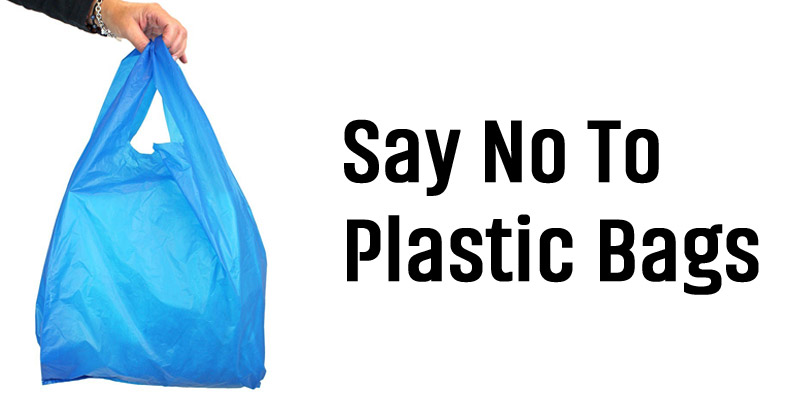Say No to Plastic Bags : Plastic bags that float in the ocean are reminiscent of jellyfish, which are the main food source for some species of sea turtles, particularly the endangered leatherback turtles. Plastic bags, which are easily collected by the wind, are a significant source of ocean plastic pollution but they also cause serious problems on the mainland, blocking drains and contributing to devastating flooding.
Why should customers Say No to Plastic Bags
Because recycling plastic bags requires special equipment that can break down plastic and transform it into a new product, most municipalities do not have the budget to incorporate recycling into their waste management programs. It’s easy for people to carry a plastic bag to pick up everyday items from nearby shops, locals and vendors.
Everything from common plastic bags to household switches, bottles and containers is made of plastic, but Buyers need to carry their own reusable fabric bags or carry their items by hand or, in some cases, use paper bags. These bags can be used for groceries and vegetables in the market. They are stronger and more durable and can carry more weight than plastic. These bags are a stronger and thicker alternative to their modern plastic bags.
Also Read : Rinku Kumari: Her efforts to make her village ODF and Swatchhagrahi awardee
Use of Plastic in India
In India, the Prime Minister Modi has imposed a nationwide ban on plastic, which hasn’t stopped people from using plastic, but it has indeed reduced the use of plastic in many industries. For example, when a consumer goes to buy groceries, he shall bring his own bag for shopping or else has to pay for the bag which in most of the stores is made of Khadi. The government officials and those deeply concerned about the environmental impact of plastic bags are keen to see the law of ban to plastic get into effect.
By choosing a place to live and packing the necessary equipment, you can easily avoid disposing of plastic and reduce the waste by switching to non-woven bags such as hemp, cotton, leather or even woven bags. If drinking straws are a habit, avoid plastic straws and use glass, paper, bamboo or steel straws.
Also Read : Ganga Action Plan: Its launch, Failure of Congress government in the project and Namami Gange
Statistics of plastic collected and Impact to environment due to use of plastic
In India, recycling of plastic generated about 25,940 tons of plastic waste every day. For the United States alone, data runs as high as 12 million barrels of oil, which are used to make even more plastic bags each year – 100 billion more to give you the exact number. Using these non-renewable resources to make plastic bags is very short-sighted given that the average life of each plastic bag is about 12 minutes and that the oil reserves of the world contain enough oil to cover our needs by 2050.
Due to the excessive and regular use of plastic in the form of shopping bags, vegetable bags, plastic bottles, containers and etc., plastic waste has had a terrible impact on the environment in general. The accumulation of plastic waste in the environment negatively affects wildlife, habitats and even humans. As a result, millions of animals and fish absorb harmful substances every year. While plastic bottles pose a major contamination problem, floating bottle caps also pose a serious threat to animals as a tempting piece of potential food.
We can blame China for their atrocious business and political tactics, but what we need to learn from them is their way of say no to plastic bags:
In China a ban on the use of thin plastic bags has resulted in a 60-80% reduction in their use in supermarkets, and restaurants can still be supplied with plastic bags for food transport, and newspapers can still be put in plastic bags to keep them dry during home delivery. For example, in Rwanda, the import, production, use or sale of plastic bags and plastic packaging is prohibited, except in certain sectors such as hospitals and pharmaceuticals.
We know that it can break down into tiny pieces of microplastics which end up in the food chain. Plastic is a parasite that damages the environment, and its negative impact on the environment is damaging our planet’s long life.
Also Read : ODF Full Form, Meaning, Statistics and Guidelines
12 Lines on Say No to Plastic Bags
- Recycle waste, conserve resources and preserve the nature of the world. Say no to plastic bags.
- If we give up garbage the future will be bitter; Don’t be stupid, garbage is ugly, keep the city beautiful or be prepared to pay the price.
- Don’t get dirty, it makes the world bitter. Say no to plastic bags.
- So plastic bags will last longer and harm our mother nature.
- What makes plastic an indispensable item in modern life is its ease of use and durability.
- Plastic is classified as a substance or material containing organic matter with a high molecular weight.
- What’s even more alarming is that less than 1% of these bags are recycled.
- Although many places have banned stock exchanges around the world, many countries (and even individual states within countries) still use them.
- Plastics are deadly to aquatic organisms and cause unnatural deaths among marine life.
- Around a lakh, animals die from poisoning after consuming plastic bags.
- Burning plastic bags releases toxic gases that can kill or poison living things and cause air pollution.
- The main use of plastic bags is for packaging, transportation of goods, etc.
